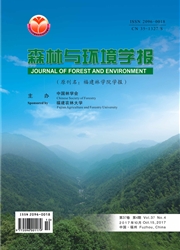

 中文摘要:
中文摘要:
通过天然黑荆树皮单宁与来自玉米及小麦剩余提取物的糠醇在酸性条件下反应,制备出一种新型无污染的热固性生物质木材胶黏剂。通过基质辅助激光解吸电离飞行时间质谱( MALDI-TOF-MS)及傅里叶红外光谱( FT-IR)对树脂的结构进行表征;采用静态热机械性能分析( TMA)对树脂的玻璃转化温度及弹性模量进行表征;通过制备胶合板的胶合强度对树脂的胶合性能进行表征。结果表明:在酸性条件下,糠醇中的羟甲基能够且主要与单宁结构单体A环上的6或8号位上的C连接而缩聚成具有一定粘度的大分子化合物。同时,与基于脲醛树脂改性尿素—甲醛—糠醇树脂相比较,单宁—糠醇树脂具有更高的弹性模量及玻璃转化温度,且基于单宁—糠醇树脂制备胶合板的胶合性能优于尿素—甲醛—糠醇树脂。
 英文摘要:
英文摘要:
A 100% renewable bio-source thermosetting adhesive, named tannin-furanic ( TF) resin , was prepared using bio-source raw materials such as mimosa tannin and furfuryl alcohol coming from tree barks and corns. The matrix-assisted laser desorption/ionization-time of flight mass spectrometry ( MALDI-TOF-MS) and Fourier transform infrared spectrometry ( FT-IR) were performed to characterize the structures of TF resins. The related properties which were found to be comparable to urea-formaldehyde-furanic resin were characterized by the measurements of elasticity modulus, glass transition temperature by thermomechanic analysis ( TMA) and bonding strength. The results indicated that the reaction of co-condensation between tannin and furfuryl alcohol indeed occurred. Moreover, TF resin showed higher elasticity modulus and glass transition temperature compared with urea-formaldehyde-furanic resin. Meanwhile, TF resin possesses an excellent bond strength.
 同期刊论文项目
同期刊论文项目
 同项目期刊论文
同项目期刊论文
 期刊信息
期刊信息
